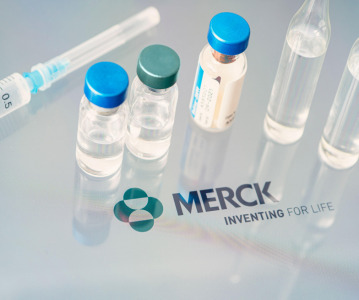Collaboration among CDMOs earmarked as greatest opportunity post-COVID

Pfizer CentreOne hopeful that collaboration in CDMO space will continue as pandemic eases
At the beginning of 2022, the pharmaceutical Contract Development and Manufacturing Organisation (CDMO) market was valued at $90 billion, growing at 7% CAGR. Continued growth is expected in the sector due a number of factors, including the global rise in chronic diseases and pandemic-induced capacity challenges.
To get a sense of the trends and opportunities in the CDMO space, CPHI sat down with Tom Wilson, Global Business Development Lead at Pfizer CentreOne, during CPHI North America last week. He gave us an insight on supply chain challenges and told us why he hopes CDMO collaboration will continue in a post-COVID world.
.png)
Tom Wilson, Global Business Development Lead at Pfizer CentreOne
Something we keep hearing is that it’s an amazing time to be a CDMO because demand is so high. What do you think is the biggest opportunity in the CDMO space right now?
Yes, the demand’s high but the challenge is there too. I would say the biggest opportunity is for us to think differently. When we went into COVID as an industry, we went into it as a bunch of islands. Which was the right business model - we're all competitors, we're all fighting tooth and claw to win the business. When COVID happened a number of the ‘big house’ CEOs came together and publicly said, ‘we're going to do everything we can together to help the world get past this challenge’.
And that really opened opportunities for us to partner with other CDMOs, for us to partner with other pharma companies, to work together, to bring our scientists together to try and solve problems. It was a real sense of collaboration and we figured, let's focus on the patient - the patient being everybody on the planet. And from there, we're going to step back and figure out how to make the business work.
And I think that really changed the perspective. Yes, we all have our skills and talents. But if we figure out ways to creatively combine those talents with different challenges, we can actually overcome the challenges better, faster and get medicines to patients. That to me is the biggest opportunity going forward.
How likely do you think it is that that collaboration will continue post-COVID?
I am heartened by what I've seen here (at CPHI North America) in the last two days. We really debated this over the winter (getting ready for this show) and we decided unanimously that if we can't help somebody, we're going to figure out who can. And if we can introduce them, great. And if we can't, we can at least get them a contact.
We're finding that people are coming over here saying that they were referred by other CDMOs to us because they felt we could help. Not only are we doing it, but without us interfacing with others we're having people referred to us. So, I think there's something there. I think there's hope. And I know hope’s not a strategy, but it's a really good sign.
Where are you seeing the greatest demand for your services at the moment?
From a technology perspective, we're seeing a couple of areas where we can help and a couple areas where we're not there yet.
In terms of where we can help, definitely sterile injectables. Also, difficult-to-make solid dose products, biologic drug substance, mammalian, and microbial.
What are the biggest challenges facing supply chains over the coming years?
There's a couple of aspects to that.
Capacity is constrained for a couple of reasons. First, you have a number of new products that were approved very quickly, that are in high demand globally to treat COVID-19 and COVID-19 symptoms. None of that existed several years ago. You've got a number of products that were delayed in clinical trials that need to come through. So, you have all this pent-up demand. On top of that, we've got a talent marketplace that we're all struggling with. So that's the pressure on capability.
Moving back upstream, we see evidence the supply bases are experiencing the same issues with glass, rubber, plastics. In terms of the plastic shortfall, now we’re seeing this as a result of constrained petroleum and we're going to see costs going through the roof.
And then there’s one which I'm amazed nobody's really talking about yet, and they should be. One of the largest compounds in stainless steel is nickel. There is an abundance of nickel mines in Ukraine, so we're going to have a challenge in stainless steel supply.
As an industry, we've got a series of ripples that we're going to have to solve for.
What differentiates Pfizer CentreOne from other CDMOs carrying out similar operations?
It's a great question and it's consistent with how we’ve started to position ourselves, which is that we're ‘altogether different’. And we are.
We are an integrated CDMO, we're not standalone. Our job is to make available the capabilities of Pfizer, to make available the science of Pfizer, to make available the people of Pfizer to our partners.
And to do that while simultaneously protecting both parties’ intellectual property. That's always a big concern when you partner with an innovative pharma house like ours. We hear concerns like, am I going to get lost? And are you going to steal my IP?
To address that concern, we built processes and robust agnostic systems to make sure that the priority is the patient. This is how we address the question of prioritization, the focus is on the patient and we do what it takes to get the medicine to the patient.
And our partners don't have to try and figure out how to navigate Pfizer all by themselves, which could be really intimidating . That is why Pfizer CentreOne is here for them. We are responsible for navigating for them and getting them what they need when they need it.
And finally when it comes to IP protections, we have very robust systems that extend to both parties. Pfizer is just as concerned about protecting its IP as our partners are about protecting their own. In almost 50 years of contract manufacturing, we have not experienced problems relating to IP protections.
What do you like about attending CPHI North America?
We are huge fans of CPHI because it brings together people with solutions and people with challenges - and sometimes you have both. Actually, most of the time you have both. So, it's a great opportunity to bring that degree of talent together and try and connect those dots.
And this relates to the new CPHI branding - ‘At the heart of Pharma’. Everybody here recognises that there's a patient at the end of everything we do. That gives us common ground to work from.
So, what is the ‘heart of Pharma’? The heart of pharma is the patient, everything's about the patient. CPHI North America gives us a chance to come together and find solutions for patients. And damn, that's a great reason to get out of bed.
Interested in hearing more from Pfizer CentreOne? Why not watch our latest webinar from Tom Wilson and Nicole Strauss, on the recipe for supply chain management success.
Related News
-
News Merck invests US$1 billion in new USA-based vaccine facility
Merck annouces the opening of a new state-of-the-art vaccine production plant in Durham, North Carolina, USA, in efforts to bring pharmaceutical product development onto home soil in face of new import tariffs. -
News US FDA adds haemodialysis bloodlines to devices shortage list
On March 14, 2025, the US FDA published an open letter to healthcare providers citing continuing supply disruptions of haemodialysis bloodlines, an essential component of dialysis machines. -
News Women in Pharma: Manufacturing personal and team success
Our monthly Women in Pharma series highlights the influential lives and works of impactful women working across the pharmaceutical industry, and how the industry can work towards making the healthcare industry and workplace more equitable and inclusive... -
News The next 15 drugs up for negotiation with Medicare include several blockbusters
By now, everyone is quite familiar with the drug price negotiations taking place between drug companies and the Centres for Medicare & Medicaid Services (CMS) in the USA as part of measures being taken to reduce the cost of drugs for patients, to make ... -
News Pfizer may shift production back to US under Trump pharma tariffs
At the 45th TD Cowen annual healthcare conference in Boston, USA, Pfizer CEO Albert Bourla outlined the potential for Pfizer to shift its overseas drug manufacturing back to the US as pharmaceutical industry players weigh their options against Presiden... -
News Experimental drug for managing aortic valve stenosis shows promise
The new small molecule drug ataciguat is garnering attention for its potential to manage aortic valve stenosis, which may prevent the need for surgery and significantly improve patient experience. -
News Trump's federal funding shift could stifle biotech innovation
Over a month into the second term of Donald Trump’s presidency and we have already seen some big changes affecting the healthcare industry. -
News Sanofi receives FDA warning over contamination at manufacturing site
The FDA issues a warning letter to Sanofi over contamination violations found at the Framingham biologics facility, in Boston, MA, USA.
Position your company at the heart of the global Pharma industry with a CPHI Online membership
-
Your products and solutions visible to thousands of visitors within the largest Pharma marketplace
-
Generate high-quality, engaged leads for your business, all year round
-
Promote your business as the industry’s thought-leader by hosting your reports, brochures and videos within your profile
-
Your company’s profile boosted at all participating CPHI events
-
An easy-to-use platform with a detailed dashboard showing your leads and performance







